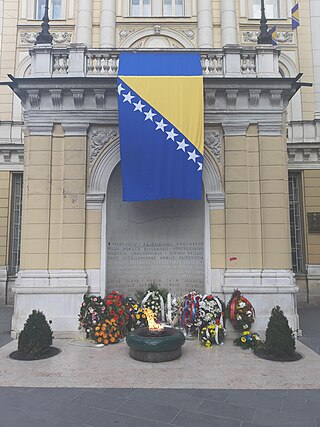The politics of Bosnia and Herzegovina are defined by a parliamentary, representative democratic framework, where the Chairman of the Council of Ministers of Bosnia and Herzegovina, named by the Presidency of Bosnia and Herzegovina, is the head of government. Executive power is exercised by the Council of Ministers of Bosnia and Herzegovina and the Presidency of Bosnia and Herzegovina. Legislative power is vested in both the Council of Ministers and the Parliamentary Assembly of Bosnia and Herzegovina. Members of the Parliamentary Assembly are chosen according to a proportional representation system. The judiciary is independent of the executive and the legislature.

The House of Representatives of Bosnia and Herzegovina is one of the two chambers of the Parliamentary Assembly of Bosnia and Herzegovina, with the other being the House of Peoples of Bosnia and Herzegovina. The chamber consists of 42 members which are elected by party-list proportional representation. 28 members are elected from the Federation of Bosnia and Herzegovina, and 14 from Republika Srpska. Members serve for terms of four years. The current membership of the chamber was elected on 2 October 2022.

The Alliance of Independent Social Democrats is a Serb political party in Bosnia and Herzegovina. Founded in 1996, it is the governing party in Republika Srpska, with its leader, Milorad Dodik, serving as the current president of Republika Srpska. The party's vice-president, Željka Cvijanović, is the current member of the Presidency of Bosnia and Herzegovina, while SNSD member Radovan Višković is the current prime minister of Republika Srpska.

General elections were held in Bosnia and Herzegovina on 1 October 2006. They decided the makeup of Bosnia and Herzegovina's Presidency as well as national, entity, and cantonal governments.
General elections were held in Bosnia and Herzegovina on 5 October 2002. Voter turnout was 55%.

General elections were held in Bosnia and Herzegovina on 3 October 2010. They decided the makeup of Bosnia and Herzegovina's Presidency as well as national, entity, and cantonal governments.
Following the general election on 3 October 2010, a process of formation of Bosnia and Herzegovina's Council of Ministers had begun. The resulting election produced a fragmented political landscape without a coalition of a parliamentary majority more than a year after the election. The centre-left Social Democratic Party, the largest party in the Federation of Bosnia and Herzegovina, and the Bosnian Serb autonomist Alliance of Independent Social Democrats, the largest party in Republika Srpska, each had 8 MPs of the total 42 MPs of the House of Representatives. Similarly, a crisis of government was also present at the local levels, as well as the Federal entity.
General elections were held in Bosnia and Herzegovina on 18 November 1990, with a second round of voting in the House of Peoples elections on 2 December. These were the final general elections to be held in Bosnia and Herzegovina while it was still a constituent republic of the SFR Yugoslavia.
General elections were held in Bosnia and Herzegovina on 14 September 1996. Voter turnout was 79.40% in the parliamentary election and 80.42% in the presidential election.
General elections were held in Bosnia and Herzegovina on 12 and 13 September 1998. Voter turnout was 67.99% in the parliamentary election and 67.87% in the presidential election.

Independence Day is a public holiday observed in the Federation of Bosnia and Herzegovina, an entity of Bosnia and Herzegovina on 1 March to celebrate the independence of the then Republic of Bosnia and Herzegovina from the Socialist Federal Republic of Yugoslavia in 1992.

The Civic Democratic Party is a political party in Bosnia and Herzegovina.
The Republican Party was a political party in Bosnia and Herzegovina founded in 1994. It adopted a secular policy but did not win support from many Bosniaks.
The Radical Party of Republika Srpska was a political party in the Republika Srpska area of Bosnia and Herzegovina.
The Democratic Socialist Party was a political party in the Republika Srpska part of Bosnia and Herzegovina.

General elections were held in Bosnia and Herzegovina on 12 October 2014. They decided the makeup of Bosnia and Herzegovina's Presidency as well as national, entity, and cantonal governments. Voter turnout was 54.47%.

General elections were held in Bosnia and Herzegovina on 7 October 2018. They decided the makeup of the presidency as well as national, entity and cantonal governments. Voter turnout was 54%.

General elections were held in the Federation of Bosnia and Herzegovina on 7 October 2018 as part of the Bosnian general elections. Voters elected the 98 members of the House of Representatives of the Federation of Bosnia and Herzegovina and the assemblies of the cantons of the Federation of Bosnia and Herzegovina.

General elections were held in Bosnia and Herzegovina on 2 October 2022. They decided the makeup of the presidency as well as national, entity and cantonal governments.
General elections were held in the Federation of Bosnia and Herzegovina on 2 October 2022 as part of the Bosnian general elections. Voters elected the 98 members of the House of Representatives of the Federation of Bosnia and Herzegovina and the assemblies of the cantons of the Federation of Bosnia and Herzegovina.










